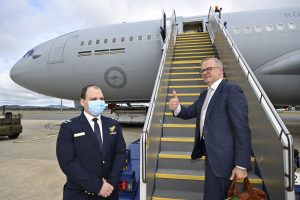Days after the spectacular implosion of Prime Minister Scott Morrison’s Coalition government and the swearing-in of his successor Anthony Albanese, attention has turned to how the new government will approach foreign policy.
As the Asia Society’s Richard Maude noted in these pages today, the Labor government will likely maintain a degree of continuity on the broader strategic questions facing Australia, particular the serious challenges posed by a more belligerent China, and the need to consolidate partnerships with allies and partners that share its concerns. But it will also seek to “put its own stamp on foreign policy” in areas where it has long been critical of the Coalition.
These differences will likely be particularly marked in relations with Southeast Asia, a region that is central to Australia’s economic and strategic future, but which has suffered from a surprising benign neglect.
Having been critical of past cuts to Australia’s diplomatic corps and international aid program, the Australian Labor Party (ALP) during the election campaign pledged to bolster the country’s relations with Southeast Asia by appointing a new senior envoy for regional affairs who can “complement existing missions and cut through bureaucratic blockages,” and creating an Office of South-East Asia within the Department of Foreign Affairs and Trade, modeled on the department’s existing Office of the Pacific, to coordinate Australian policies toward the region.
Additionally, the ALP said it would also deliver an additional $470 in bilateral and regional Overseas Development Assistance to Southeast Asia, focusing on Indonesia, Cambodia, Laos, the Philippines, and Vietnam. Most potentially attractive from the Southeast Asian perspective is the party’s promise to set out a comprehensive ASEAN Economic Strategy “to map current and future export and investment opportunities across key ASEAN markets for Australian business and transform Australia’s economic links to the region” by 2040.
A Labor government stands a good chance of reversing of ameliorating other policies introduced during the past decade of conservative government, such as the disastrous marketization of the higher education sector, which has undercut the intellectual foundations of Australian engagement with its Southeast Asian neighbors. A rough proxy for the this is the steep decline in the offering of Southeast Asian languages by public universities that are increasingly encouraged to view themselves as commercially focused entities. On that front, Labor has promised to set up a two-year pilot program for “flexible in-country language studies programs in Vietnam,” based on the model pioneered by the Australian Consortium for In-Country Indonesia Studies, which has contributed greatly to generating intellectual and people-to-people ties with Australia’s largest neighbor.
While there is a lot of detail yet to be elaborated, and the ALP’s pledge that it will become more serious on human rights issues could court friction in some parts of Southeast Asia, the initial noises from neighbor are good news for nations hoping for closer, more multi-faceted Australian engagement with their region. Under Scott Morrison, the Coalition government succeeded in advancing relations with Southeast Asia, particularly with Vietnam and Indonesia. But its announcement of the AUKUS trilateral partnership with the United States and United Kingdom without the consulting of key Southeast Asian partners did not go down in the region, which feared it would push it further toward superpower conflict.
In an echo of the past two U.S. administrations, its approach to the region has featured a heavy focus on security, coupled with salvos of the sort of crude and ideological anti-China rhetoric, intended to a great extent as domestic political signaling, that tends to alienate Southeast Asian governments. The signs from Labor on this front are more encouraging. Speaking to reporters this morning before departing to the Quad summit in Tokyo, Albanese gave the indication that he would maintain a strong line on China saying, “It is China that has changed, not Australia. And Australia should always stand up for our values.”
At the same time, in a speech last September, incoming Foreign Minister Penny Wong criticized the Morrison government and its senior ministers for “relying on unhelpful binaries that reinforce existing prejudices of Australia in the region or reduce our complex environment to Cold War analogies.”
As Greta Nabbs-Keller, a senior research affiliate for the UQ Centre for Policy Futures at the University of Queensland, pointed out recently in The Conversation, the key to success in Southeast Asia is to craft “a more sophisticated narrative on the role of China in the region” that avoids alienating important partners who also prize their close economic relations with Beijing.
“Governments must also respect the sustainable economic development priorities of Southeast Asian countries on their own terms, not just as pawns in a larger geopolitical game,” she argued. “On this point, it seems Labor is leading.” While much remains to be done in translating campaign pledges into realities, the new government has all the ingredients for a more productive, less alienating approach to the region.

































